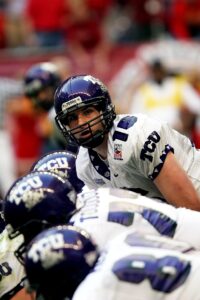Recently, Governor Roy Cooper enacted a Name, Image, Likeness (NIL) law for North Carolina's colleges, universities and institutions. This makes North Carolina one of the first states to see this type of legislation go live. It also means that intercollegiate student athletes now have the ability to earn compensation for the use of their NIL, particularly as it relates to endorsements. What does the NC NIL Law mean for the relationship between an athlete and their agent? Today we'll unpack exactly what all of this means.
 Defining the Relationship as it relates to the NIL Law: Athlete Agent vs. Student Athlete
Defining the Relationship as it relates to the NIL Law: Athlete Agent vs. Student Athlete
An athlete agent is an individual who enters into an agency contract with a student-athlete; solicits or recruits a student-athlete to enter an agency contract; or holds himself or herself out to the public as an athlete agent.
A student-athlete is anyone who engages in; is eligible to engage in; or may be eligible in the future to engage in any intercollegiate sport. This includes college students, high school students, high school dropouts, or high school graduates who delay enrollment in a college.
If a student-athlete becomes ineligible to play a specific sport in high school or college, he/she is not considered a student-athlete for that sport. For example, if a student-athlete plays both high school basketball and football, and then signs a contract to play professional basketball, the student is no longer considered a student-athlete in basketball. The student would still be considered a student-athlete in football.
An agency contract is a legal agreement between a student-athlete and an agent. It authorizes the agent to negotiate contracts for the student-athlete or solicit, on behalf of the student-athlete, a professional sports services contract or an endorsement contract.
You can find the Uniform Athlete Agents Act in Article 9 of Chapter 78C of the North Carolina General Statutes.
According to the NIL Law, if you act as an agent in North Carolina, you must register with the North Carolina Department of the Secretary of State unless you are exempt. To be exempt, you must be one of the following:
- The student-athlete's spouse, parent, sibling, or guardian; or
- One acting only on behalf of a professional sports team or organization; or
- A licensed NC attorney, who is a resident of NC, represents no more than two student-athletes, and who does not advertise or claim you are qualified to represent student-athletes.
Business many not register as an agent according to the NIL Law.
Is it possible to act as an agent without registering?
It is possible to act as an agent without registering, but the exception is very narrow and temporary. You may act temporarily as an agent if the student-athlete or someone else initiates contact with you. However, you must register as an athlete agent within seven days of your first act as an agent. You must never sign an agency contract with the student-athlete without being registered. Doing so automatically voids the agency contract and the athlete agent must return anything received under it.
Responsibilities of the Athlete Agent
An athlete agent must give written notice to the athletic director of any school the student-athlete attends or may attend that they are now representing the student-athlete. The athlete agent must also give notice before the student-athlete's next scheduled athletic event or within 72 hours after the student-athlete signs a contract, whichever comes first.
In order to get a student-athlete to sign an agency contract, an athlete agent:
- Cannot lie to or mislead the student-athlete;
- Cannot give anything of value to the student-athlete before the student-athlete signs the agency contract; and
- Cannot give anything of value to anyone other than the student-athlete or another registered athlete agent.
Furthermore, under NIL Law and within this relationship, records must be maintained for five years. In fact, an athlete agent must produce these records at any time if asked. These include:
- Names and addresses of all student-athletes represented
- All agency contracts; and
- All direct costs to the athlete agent for soliciting the student-athlete to sign an agency contract.
Responsibilities of the Student-Athlete
A student-athlete must give written notice to the athletic directors of any school they attend or may attend that they are being represented by an athlete agent. The student-athlete has to give notice before the student-athlete's next scheduled athletic event or within 72 hours after the student-athlete signs a contract, whichever comes first.
Student-athletes can cancel a contract by giving the agent written notice within 14 days of signing the contract. Student-athletes who cancel their contracts are not required to repay any consideration they received from the athlete agent. A student-athlete cannot waive the right to cancel agency contracts, but they are still very much protected until this law.
What Athlete Agents Need to Know
You cannot solicit a student-athlete until after you register.
You cannot solicit a student-athlete after your registration expires, unless you re-register.
You must tell a student-athlete that signing the agency contract ends the student-athlete's eligibility in that sport.
You must date an agency contract on the day that the contract is actually signed.
You cannot lie or mislead on your application for registration.
You cannot violate any provision of the North Carolina Uniform Athlete Agents Act.
If you have any questions regarding the NC NIL Law, please contact our offices.

